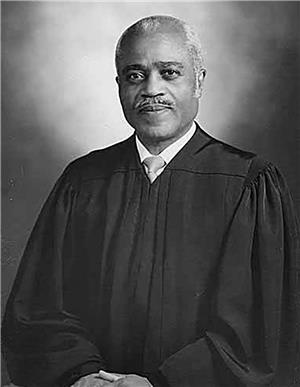In 1950, Charles Stokes was elected to the Washington state legislature from the 37th District in central and southeast Seattle, becoming the first black legislator from King County. The only black legislator before him was William Owen Bush (1832-1907), who took office in 1889. In 1968, Charles Stokes was appointed judge to King County District Court, again becoming the first black person to serve in this position.
Charles Stokes was born in Fredonia, Kansas, and raised in Pratt, Kansas. He attended a vocational high school in Topeka after dropping out of school for several years. He returned to Pratt to complete his high school education. While attending Kansas University, he worked as a custodian in a sorority house and played in a dance band to support himself.
He graduated from the University of Kansas Law School in 1931, and opened his own law practice in Leavenworth, Kansas. In the late 1930s, he was appointed assistant attorney for the Kansas Commission of Revenue and Taxation in Topeka. The job was unrewarding. After he learned that only one black lawyer was practicing in Seattle (John Prim in the prosecuting attorney’s office), he decided to move there and practice law in 1943.
Charles Stokes was a dedicated Republican and was quite proud of the fact that he had served as vice president of the Young Republican National Federation. In 1952, he spoke from the platform of the Republican National Convention on behalf of Dwight Eisenhower’s candidacy.
Stokes ran for state legislator and won elections in 1950 and in 1952. In 1954, he ran for state senate against Pat Sutherland and lost, but in 1956 regained his seat in the house. He was the sole black legislator during those years.
During his three-year term in the state legislature, he was named the outstanding freshman GOP House member from King County. He received a standing ovation from the legislature when he spoke on the willingness of black people to fight in the Korean War despite Paul Robeson’s stance against the war. The speech was aired on the Voice of America. (Paul Robeson [1898-1976] was an internationally renowned African American concert singer and actor associated with communist causes.)
Stokes introduced the bill for a state lottery in the late 1950s. Another accomplishment was his co-sponsoring of the Civil Rights Omnibus Bill, which helped place Washington in the forefront of civil-rights legislation.
Defeated by Sam Smith, another prominent black politician, in 1958, Charles Stokes ran unsuccessfully for lieutenant governor in 1960. In 1968, he was appointed judge in King County District Court by the County Commissioners, becoming the first black person to hold this position. In later elections for this position, he won and then ran unopposed.
Retiring as judge in 1978, he served occasionally as a judge pro tem in King County District Court and again practiced law in an office on Seattle's 12th Avenue.
Charles Stokes died on November 25, 1996. In September 1998, an overlook in the Sam Smith Park on the I-90 Freeway lid was named in honor of this gifted orator and civil rights advocate.

